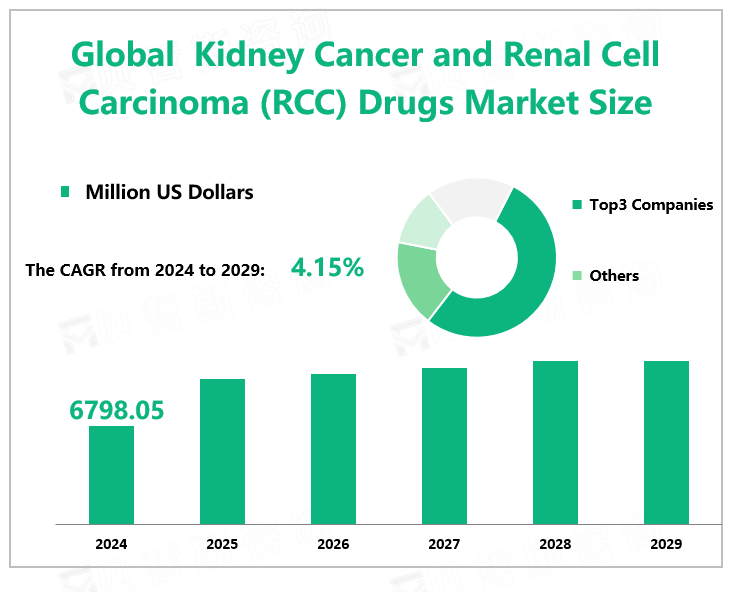Global Kidney Cancer and Renal Cell Carcinoma (RCC) DrugsMarket Overview
According to Global Market Monitor, the global kidney and renal cell carcinoma drugs market will be $6798.05 million in 2024 with a CAGR of 4.15% from 2024 to 2029.
Kidney cancer/ renal cell carcinoma (RCC) is among the ten most commonly observed cancers these days. It is the sixth most common cancer observed in men and it is the tenth most common cause of cancer for women. The symptoms of kidney cancer/ renal cell carcinoma (RCC) include a lump or mass in the abdomen or side, blood in the urine, weight loss, fever, and lethargy. Several drugs for the treatment are currently available in the market.
Market News
In early October 2024, Arcus Biosciences, Inc. AstraZeneca and AstraZeneca have entered into a clinical trial collaboration to evaluate a novel combination therapy for the treatment of clear cell renal cell carcinoma, a common form of kidney cancer that will be the focus of the collaboration. The collaboration aims to explore the potential combination effect of Arcus' experimental HIF-2a inhibitor Casdatifan with AstraZeneca's experimental PD-1/CTLA-4 bi-specific antibody volrustomig. The collaboration aims to leverage the unique mechanisms of the two drugs to establish a potential first-of-its-kind and best-in-class treatment. This marks the second clinical collaboration between the two companies, following an agreement in 2020 to study combination therapies for non-small cell lung cancer.
Current Situation of China
RENOTORCH is the first phase III clinical study to validate the target immunotherapy combination in the Chinese population of renal cell carcinoma, filling the gap in first-line immunotherapy of renal cell carcinoma in the Chinese population, and is being conducted in 47 clinical research centers nationwide to evaluate the efficacy and safety of toripalimab combined with axitinib in high-risk patients with unresectable or metastatic RCC in first-line therapy. According to their findings published in 2023, first-line treatment of toripalimab in combination with axitinib in patients with unresectable or metastatic RCC significantly extended patient progression-free survival (PFS) by nearly 2 times and reduced the risk of disease progression or death by 34 percent compared to Sunitinib monotherapy.

Market Drivers
The driving factors of the kidney cancer and renal cell carcinoma (RCC) drugs market include lifestyle changes, increased smoking and tobacco consumption levels, the abuse of certain painkillers, obesity, and the growth of the elderly population. The rise in kidney cancer and renal cell carcinoma and the relative lack of effective therapies indicate the scope of this market. Chemotherapy is ineffective against renal cell carcinoma and causes various side effects such as nausea and vomiting, as well as weight and hair loss. It can also inhibit the production of new blood cells, causing fatigue, anemia, easy bruising or bleeding, and increasing the risk of infection. Therefore, chemotherapy is now replaced by targeted drugs and immunotherapy.
In the kidney cancer and renal cell carcinoma (RCC) drugs market, the use of combination therapy is trending. Combination therapy combines the effects of various drugs, thereby reducing the possibility of producing anti-cancer cells. A better understanding of the causes and effects of kidney cancer led to the discovery of combination treatments. Under this treatment, drugs derived from vascular endothelial growth factor (VEGF) stimulate the proteins in the blood and combine with mammalian targets of rapamycin inhibitors to help promote cell biogenesis.
|
Drivers |
Increasing prevalence of kidney cancer |
|
Combination therapy |
|
|
Constraints |
High drug cost |
|
Fierce competition |
We provide more professional and intelligent market reports to complement your business decisions.